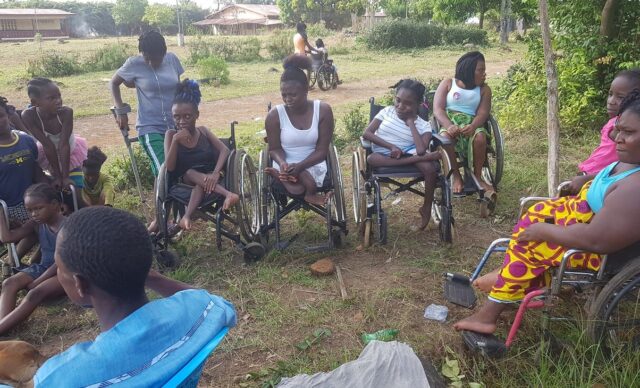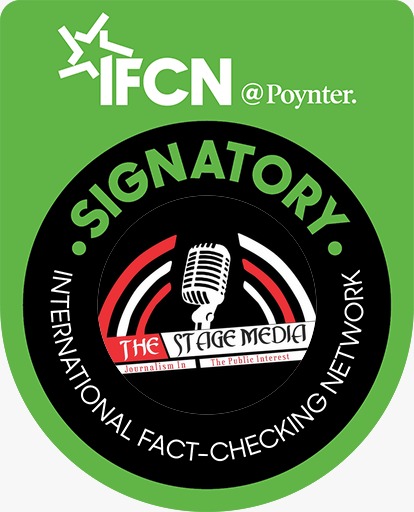
“During the height of the virus, my family and I found it difficult to get food. My mother couldn’t even sell like before to take care of us,”- Victoria Kollie, 19 years.
Paynesville- According to the United Nations, persons with disabilities are among the hardest hit by COVID-19. Even under normal circumstances, more than one billion persons with disabilities worldwide are less likely to access health care, education, employment and more likely to live in poverty and experience violence.
COVID-19 further compounds this situation, particularly for people with disabilities in fragile contexts and humanitarian settings such as Liberia. They face a lack of accessible public health information, significant barriers to implement basic hygiene measures, and inaccessible health facilities.
The lockdown measures include, social distancing, physical distancing, hygiene and health practices are among safety measures against the impact of the COVID-19 pandemic, which affects individuals, families, businesses, institutions and communities more especially the disabled.
Series of reports have it that the effects of COVID-19 are perhaps more profound when viewed through the lens of persons with disabilities. These impacts are many, diverse and vary from country to country and across the diversity of disabilities.
This story captures concerns raised by people living with disabilities in Liberia amid the scourging difficulties posed by the outbreak of the coronavirus in a nation with a weak economy, large poverty rate and under-developed status.
Liberia has approximately 5 million people. Exact statistics about disability in Liberia are out of date but according to a UNICEF study from 1997, 16 percent of the population has a disability.
The report continues that 16 percent, 61 percent struggle with mobility, 24 percent are visually impaired, seven percent are defendants eight percent have an intellectual or psychosocial disability.
Speaking to a 2019 survey conducted by “The Global Initiative for Inclusive ICTs” the Executive Director of the National Commission on Disability; Ricardia Badio Dennis said one of the challenges confronting the disabled community is the mind of people towards them.
The survey revealed that there is no focus or a strict connection between persons living with disabilities and the social economy.
The President of the National Organizations o Persons with Disabilities Naomi B. Harris also told the institution that people living with disabilities have been left out of every sector of the country.
Every morning, afternoon and evening hours, the famous ELWA Junction in Paynesville City, miles away from Monrovia entertain a huge number of disabled individuals. Many of them come out here usually to solicit help from passersby and goodwill individuals in order to cater for their family in most cases grandchildren.
Victory Kollie, 19 years, visually impaired with no child or children said since the outbreak of the pandemic finding food has been difficult.
“My family bare eat twice a- daily because I have to walk from Soul Clinic Community through Red-Light to ELWA Junction to beg in order to find a daily meal,”
“During the height of the virus, my family and I found it difficult to get food. My mother couldn’t even sell like before to take care of us.” She mentioned.
All this was happening because of the lockdown measure put in place and moreover, some of the people who used to help bring food for us stopped simply because of the virus.” Victoria said in a sad tone.
She furthered that organizations and other NGOs that were catering to people with disabilities have stopped and many have pulled out of Liberia.
Ms. Kollie said there is a need that the government to put in measures that will enable the country to take good care of people living with disabilities.
“And the NGO that used to help can’t just leave us alone, because currently, we are fetching for ourselves and families.”
“The feeding station has to start again to help disabled people in the country and also widen their outreach across the country to safe thousands of citizens with disabilities,” said Kollie.
Mr. Harris Winks, 46 years, disabled makes his way every morning to ELWA Junction with the aid of a minor.
Winks with an already disable condition was told by Medical practitioners that he couldn’t have biological children.
He hails from Lofa County where the rest of his families are but was brought to Monrovia by an unknown man believed to be his uncle only known as George.
“All of my families are in Lofa, I was brought to Monrovia by one man by the name of George who I was told is my uncle.”
Harris is abandoned with no food nor proper welfare as a disabled. It seems all hope is lost as his supposed uncle is nowhere to be found; a situation that has led him to linger at the ELWA Junctions begging to feed himself.
“I am afraid of losing my life, especially during this time. No care, no food to eat and nowhere to sleep. I am only here by the grace of God.” Harris told TSM.
Jerry Lartey, 50 years, another physically challenged said living as a disabled person especially at the time of the global pandemic has been challenging for him prior to the outbreak of COVID-19 in Liberia.
“Life has been difficult for me since the outbreak of the virus in Liberia. It was a little bit okay before the outbreak for now it is not easy on me and that every day I have to come here begging people just to get little things for myself. He mentioned.
According to Mr. Lartey, the 3 pm restrictions and partial lockdown measures implored by the government in an attempt to curb the further spread of the coronavirus made it worst for him and fellow disabled individuals.
Lartey heaped praises on First Lady Madam Clar M. Weah for what he termed as her humanitarian gesture directed at disabling people in the country through the ‘Clar Hope Foundation’.
He told TSM that although their (disabled) conditions they’re being given expressed hope through different educational and skills training which he said will go a long way with them.
Grace Famah, 26 years, sits at the Ministry of Transport begging people to help feed her.
She came from Bomi to seek education in Monrovia through her aunt but out of sudden, she has no idea where the aunt is.
“My aunt left me in the house without telling me where she was going, till date, I have no idea about her whereabouts.
Grace left the aunt’s home and has resulted in living in Sonnewein one of the slum’s communities in Monrovia.
She begs as a way of life to fetch for her and her 8-month old baby, she is assisted by a 10-year-old minor.
Grace said the pandemic has been a nightmare for her and the two children, “From the start of the lock-down, the government should have seen the need to assist us, because we can’t work, no space for us, we are doing everything on our own.
She continues, “Life has been very unbearable because many days, no food for me and the two children, imagine sometimes, we soak gari and eat it because times are hard and no one is assisting us like before.
At least twenty-four (24) disabled people organizations (DPOs) and five (5) government line ministries in 2018 signed a joint resolution seeking the inclusion of persons living with disabilities in the country’s governance process.
The 24 disabled organizations are under the Alliance for Disabilities while the five government line ministries include the Ministries of Public Works, Education, Gender, Justice and Health.
The group also adopted a five-year National Action Plan for the Inclusion of Persons with Disabilities as a National Document to promote the welfare and rights of persons with disabilities throughout Liberia but not much has been done evidenced by the challenges still confronting disabled people in the country.




